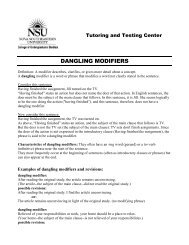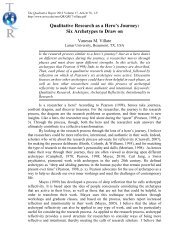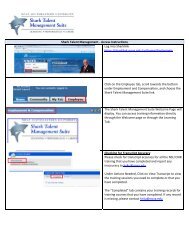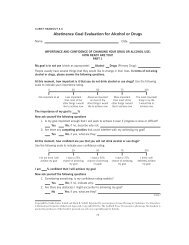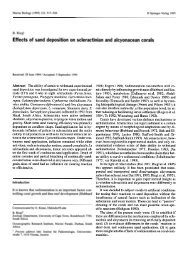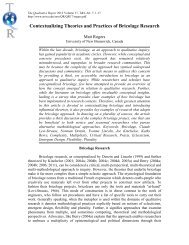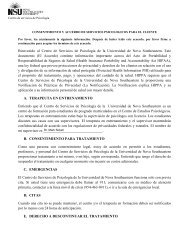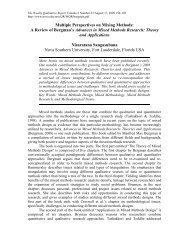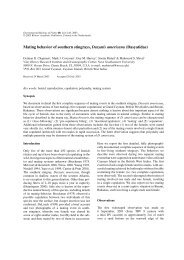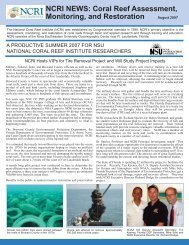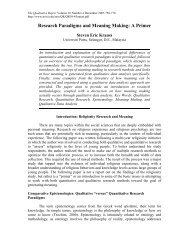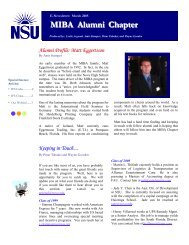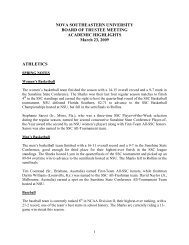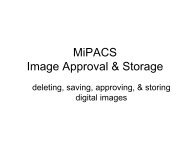11th ICRS Abstract book - Nova Southeastern University
11th ICRS Abstract book - Nova Southeastern University
11th ICRS Abstract book - Nova Southeastern University
Create successful ePaper yourself
Turn your PDF publications into a flip-book with our unique Google optimized e-Paper software.
23-33<br />
Integrated Research, Development, And Education Activities Enhance The Success<br />
Of Community-Based, Marine Resource Management in The Korolevu-I-Wai<br />
District, Fiji<br />
Victor BONITO* 1 , Bill AALBERSBERG 2 , Kini RAVINALOA 3<br />
1 Reef Explorer Fiji, Votua village, Fiji, 2 Institute of Applied Sciences, <strong>University</strong> of the<br />
South Pacific, Suva, Fiji, 3 FLMMA Representative, Votua Village, Votua village, Fiji<br />
Community-based management is an effective means to accomplish biodiversity<br />
conservation and replenish depleted inshore fish stocks, particularly on Pacific islands<br />
whose indigenous communities have significant control over their resources. The Fiji<br />
Locally-Managed Marine Areas (FLMMA) Network involves the participation of over<br />
200 communities across Fiji and covers approximately 30% of near-shore areas. Active<br />
participation in and contribution to FLMMA was complimented by a village-based coral<br />
reef ecologist who undertook and assisted with the implementation of a suite of research,<br />
development, and educational activities in the Korolevu-I-Wai district. Having an<br />
ecologist based on-site and living within the community boosted local initiative and<br />
support for resource management and conservation activities, as well as facilitated and<br />
improved the implementation of management actions, development activities, and<br />
research programs. Simultaneously targeting community development priorities and<br />
economic needs along with resource management strengthened support for resource<br />
management and conservation actions. Governance issues and the growing economic<br />
needs of traditional resource owners are perhaps the greatest obstacles to community<br />
support for management actions and resource management success. Poor land-use<br />
practices and waste from land-based development remain as major threats to marine<br />
resources. With considerable threats to resources coming from people who have no legal<br />
or traditional ties to the resources nor are under the influence of local traditional<br />
governance, compliance to and enforcement of community management initiatives<br />
remains a challenge to traditional resources owners.<br />
23-34<br />
Reef Management Using Traditional Management Practices in Vanuatu<br />
Zaidy KHAN* 1,2 , Tevi MALTALI 3,4 , Sompert RENA 3,5<br />
1 Communites and Coast, Foundation of the People of the South Pacific International,<br />
Suva, Fiji, 2 Locally Managed Marine Area Network, Suva, Fiji, 3 Coastal Program,<br />
Foundation of the People of the South Pacific Vanuatu, Villa, Vanuatu, 4 Village Based<br />
Resource Managed Area Network, Villa, Vanuatu, 5 Department of Fisheries, Ministry of<br />
Agriculture,Forestry and Fisheries, Villa, Vanuatu<br />
In 2005, the Foundation of the People of the South Pacific international ( FSPI) and its<br />
network partner FSP Vanuatu (FSPV) initiated pilot projects on community based coastal<br />
resource management together with the Vanuatu Department of Fisheries (VDF), and<br />
WanSmol Bag Theatre . In 1990 the VDF started a village based trochus<br />
(Trochusniloticus) management program which included a yearly harvest plan. This<br />
concept was favorably received by many villages and later extended by implementing<br />
control on other marine resource harvest by setting traditional “tabus” or Marine<br />
Protected areas (MPAs) to manage their reef resources. The MPAs were ceremonially<br />
demarcated by village chiefs.<br />
Although the benefits of tradition protection is recognized by the government and other<br />
stakeholders in marine resource management, in recent years this management practices<br />
has faded due to loss of traditional and cultural values and limited government resources.<br />
With the technical assistance from VDF, FSPV has been supporting indigenous<br />
communities in assisting reef management models and tools such as MPAs through<br />
developing community coastal resource management plans and reviving tradition<br />
practices during demarcation of MPAs. So far the project have launched management<br />
plans for Paunagisu and Marou in North Efate, Aneityum Mystery island after a 3 year<br />
community process through reviving their customary ceremonies on pig killing and turtle<br />
tagging together with national governments. This tradition and ceremonial launching of<br />
community based coastal management plans with national government has drawn a high<br />
level of respect, unity and recognition for village base MPAs and has highlighted<br />
spiritual importance of respect for chiefly governance systems. The traditional<br />
management approach by communities is spreading across Vanuatu, together with words<br />
of success of restocking and spill over benefits experienced from MPAs and is becoming<br />
a model and nation wide strategies for community based coastal management.<br />
Oral Mini-Symposium 23: Reef Management<br />
23-35<br />
Coral Reef Management in The Pacific Islands: Governance At Risk<br />
Jean-Brice HERRENSCHMIDT* 1,2 , Sven MENU 2 , Pascal HÉBERT 2 , Pascal DUMAS 1,3<br />
1 IRD, Noumea, New Caledonia, 2 GIE Oceanide, Noumea, New Caledonia, 3 <strong>University</strong> of New<br />
Caledonia, Noumea, New Caledonia<br />
The Pacific Islands populations rely on their coral reefs. Some Pacific countries are therefore<br />
involved in International and Regional initiatives to protect them at a large scale with the<br />
International Community support. The authors are in charge of the implementation of<br />
community-based management plans and of scientific assessments within the framework of two<br />
major initiatives: the nomination of the coral reefs of New Caledonia on the World Heritage<br />
List and the Coral Reef Initiatives for the Pacific (CRISP) in Vanuatu, Fiji and French<br />
Polynesia.<br />
The integrated and participative approach developed aims at avoiding some traps from the<br />
predominant ideologies led by most of Marine Protected Areas (MPAs), community-based<br />
management and sustainable development processes. Pacific cultures and customs are rich and<br />
their linkages with marine resources management are real, but the predominant methodologies<br />
either phantasm about them, either promote ideological maladjusted and simple recipes, which<br />
reveals post-colonial Governance difficulties and risks.<br />
The Pacific societies organisations, Coral reef ecosystems and the management of archipelago<br />
countries are extremely complex. Many Pacific countries are politically unstable and their<br />
colonial heritage is diverse. The World Heritage nomination process of New Caledonia coral<br />
reefs, in a political context of decolonisation and in comparison with other Pacific countries,<br />
contributes to imagine new directions for coral reef management effectiveness. Interdisciplinary<br />
approaches and Island management from the reach down to the reef help to handle complexity.<br />
The adaptation of legal tools, Public Service capacity building and collective critical<br />
discussions about the public vs private status of the marine environment are complementary<br />
actions needed to promote modern integration of skills and competences. Responsible Coral<br />
reef and marine areas management thus play an important role in integrating Pacific cultures<br />
and modern tools, and more generally, in strengthening citizenship and state policies in order to<br />
contribute to better governance and political stability.<br />
23-36<br />
Conserving Ecological Integrity Only If “Absolutely Necessary” – How Florida and<br />
National Park Service Policies on Marine Reserves Threaten Coral Reef Ecosystems in<br />
Biscayne National Park, Florida<br />
David WHITE 1 , Jack SOBEL* 2<br />
1 Southeast Regional Office, Ocean Conservancy, St Petersburg, FL, 2 Strategic Conservation,<br />
Science & Policy, Ocean Conservancy, Washington, DC<br />
When Congress created Biscayne National Park in 1980, healthy coral reefs in the park<br />
supported robust fish and invertebrate populations. In 1983, the National Park Service (NPS)<br />
adopted a management plan establishing intent to manage recreational and commercial fishing<br />
to “sustain a composition of native marine populations similar to that which existed prior to<br />
fishing pressure.” A 2001 assessment of fisheries resources and habitats in the park concluded<br />
that, following decades of significant recreational and commercial fishing pressure and related<br />
habitat impacts, the extremely poor status of reef fish resources signaled “imminent resource<br />
collapse.” In 2002, NPS and the State of Florida, which share jurisdiction over fishing in the<br />
park, agreed to jointly develop a plan to manage fishing for the next 10-15 years. The<br />
state/federal agreement, codified in a Memorandum of Understanding, establishes and adopts<br />
Florida’s policy that marine reserves (no-take areas) are overly restrictive and will not be<br />
implemented unless both parties agree it is “absolutely necessary.” This agreement was<br />
renewed until 2012, despite a draft environmental impact statement acknowledging that marine<br />
reserves would be required to protect and conserve ecosystem biodiversity, function, and<br />
services, and to begin to restore fishery-impacted ecosystems to natural levels. A policy of only<br />
considering marine reserves within the park if all parties agree it is “absolutely necessary” sets<br />
too high a bar for ecosystem management of coral reefs in urban areas, precludes efforts to<br />
protect natural resources from impairment in national parks in the United States, and<br />
undermines a “key conservation objective” of the United States Coral Reef Task Force to<br />
protect twenty percent of Florida’s coral reefs as marine reserves by 2010.<br />
204



